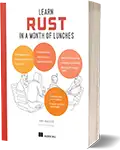Learn Rust in a Month of Lunches
Programming
Book Details
Book Title
Learn Rust in a Month of Lunches
Author
Daye Macleod
Publisher
Manning
Publication Date
2024
ISBN
9781633438231
Number of Pages
569
Language
English
Format
File Size
5.7MB
Subject
Programming
Table of Contents
- Learn Rust in a Month of Lunches
- brief contents
- contents
- foreword
- preface
- acknowledgments
- about this book
- about the author
- 1 Some basics
- 1.1 Introducing Rust
- 1.2 Comments
- 1.3 Primitive types: Integers, characters, and strings
- 1.4 Type inference
- 1.5 Floats
- 1.6 “Hello, World!” and printing
- 1.7 Declaring variables and code blocks
- 1.8 Display and Debug
- 1.9 Smallest and largest numbers
- 1.10 Mutability (changing)
- 1.11 Shadowing
- Summary
- 2 Memory, variables, and ownership
- 2.1 The stack, the heap, pointers, and references
- 2.2 Strings
- 2.3 const and static
- 2.4 More on references
- 2.5 Mutable references
- 2.6 Shadowing again
- 2.7 Giving references to functions
- 2.8 Copy types
- 2.9 Variables without values
- 2.10 More about printing
- Summary
- 3 More complex types
- 3.1 Collection types
- 3.2 Control flow
- Summary
- 4 Building your own types
- 4.1 A quick overview of structs and enums
- 4.2 Destructuring
- 4.3 References and the dot operator
- Summary
- 5 Generics, option, and result
- 5.1 Generics
- 5.2 Option and Result
- Summary
- 6 More collections, more error handling
- 6.1 Other collections
- 6.2 The ? operator
- 6.3 When panic and unwrap are good
- Summary
- 7 Traits: Making different types do the same thing
- 7.1 Traits: The basics
- 7.2 The From trait
- 7.3 The orphan rule
- 7.4 Getting around the orphan rule with newtypes
- 7.5 Taking a String and a &str in a function
- Summary
- 8 Iterators and closures
- Iterators and closures
- 8.1 Chaining methods
- 8.2 Iterators
- 8.3 Closures and closures inside iterators
- Summary
- 9 Iterators and closures again!
- 9.1 Helpful methods for closures and iterators
- 9.2 The dbg! macro and .inspect
- Summary
- 10 Lifetimes and interior mutability
- 10.1 Types of &str
- 10.2 Lifetime annotations
- 10.3 Interior mutability
- Summary
- 11 Multiple threads and a lot more
- 11.1 Importing and renaming inside a function
- 11.2 The todo! macro
- 11.3 Type aliases
- 11.4 Cow
- 11.5 Rc
- 11.6 Multiple threads
- Summary
- 12 More on closures, generics, and threads
- 12.1 Closures as arguments
- 12.2 impl Trait
- 12.3 Arc
- 12.4 Scoped threads
- 12.5 Channels
- Summary
- 13 Box and Rust documentation
- 13.1 Reading Rust documentation
- 13.2 Box
- Summary
- 14 Testing and building your code from tests
- 14.1 Crates and modules
- 14.2 Testing
- 14.3 Test-driven development
- Summary
- 15 Default, the builder pattern, and Deref
- 15.1 Implementing Default
- 15.2 The builder pattern
- 15.3 Deref and DerefMut
- Summary
- 16 Const, “unsafe” Rust, and external crates
- 16.1 Const generics
- 16.2 Const functions
- 16.3 Mutable statics
- 16.4 Unsafe Rust
- 16.5 Introducing external crates
- Summary
- 17 Rust’s most popular crates
- 17.1 serde
- 17.2 Time in the standard library
- 17.3 chrono
- 17.4 Rayon
- 17.5 Anyhow and thiserror
- 17.6 Blanket trait implementations
- 17.7 lazy_static and once_cell
- Summary
- 18 Rust on your computer
- 18.1 Cargo
- 18.2 Working with user input
- 18.3 Using files
- 18.4 cargo doc
- Summary
- 19 More crates and async Rust
- 19.1 The reqwest crate
- 19.2 Feature flags
- 19.3 Async Rust
- Summary
- 20 A tour of the standard library
- 20.1 Arrays
- 20.2 char
- 20.3 Integers
- 20.4 Floats
- 20.5 Associated items and associated constants
- 20.6 bool
- 20.7 Vec
- 20.8 String
- 20.9 OsString and CString
- Summary
- 21 Continuing the tour
- 21.1 std::mem
- 21.2 Setting panic hooks
- 21.3 Viewing backtraces
- 21.4 The standard library prelude
- 21.5 Other macros
- Summary
- 22 Writing your own macros
- 22.1 Why macros exist
- 22.2 Writing basic macros
- 22.3 Reading macros from the standard library
- 22.4 Using macros to keep your code clean
- Summary
- 23 Unfinished projects: Projects for you to finish
- 23.1 Setup for the last two chapters
- 23.2 Typing tutor
- 23.3 Wikipedia article summary searcher
- 23.4 Terminal stopwatch and clock
- Summary
- 24 Unfinished projects, continued
- 24.1 Web server word-guessing game
- 24.2 Laser pointer
- 24.3 Directory and file navigator
- Summary
- index
- Learn Rust in a Month of Lunches -back
